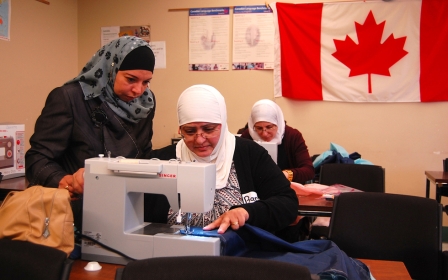Canada’s senate to debate Iran sanctions
TORONTO, Canada – A Canadian senator has urged his colleagues to abandon a proposed bill that would impose sanctions on Iran, saying that the draft does not fulfil its stated aim “to deter Iran-sponsored terrorism, incitement to hatred, and human rights violations”.
But on Wednesday, the Standing Senate Committee on Foreign Affairs and International Trade voted in favour of moving Bill S-219 to a debate in Canada’s Senate chamber.
Senator Yuen Pau Woo described the bill as “deeply and fundamentally flawed”.
“I believe the flaws in this bill are too fundamental and too many to warrant the further attention of honourable senators in this committee or of our colleagues in the chambers as a whole,” he said on Wednesday.
Conservative Senator David Tkachuk first introduced the bill, also known as the Non-Nuclear Sanctions Against Iran Act, in December 2015.
It would require Canada’s Minister of Foreign Affairs to publish an annual report on “Iran-sponsored terrorism, incitement to hatred, and human rights violations” and identify persons or entities believed to be involved in those activities.
The bill also stipulates that Canadian sanctions against Iran cannot be eased until two consecutive annual reports find “that there is no credible evidence of terrorist activity or incitement to hatred emanating from Iran and that there has been significant progress in Iran in respect of human rights”.
It also requires Canada’s Minister of Public Safety and Emergency Preparedness to look into recommending whether the Iranian Revolutionary Guard Corps (IRGC) should be added as a terrorist group under the Canadian Criminal Code.
If the full Senate approves the bill, it will be sent to the House of Commons, where it will be up for another review and debate. Both houses must approve the bill in identical form before it can become a law.
Irwin Cotler, a former Canadian justice minister, a Liberal MP and staunch supporter of Israel, has spoken in favour of the bill.
“As a responsible actor of the international community, we have a responsibility to enforce international human rights norms, to combat the culture of impunity,” Cotler told the Senate committee in February.
Cotler added that imposing sanctions on Iran would not preclude engagement with the country’s government or its citizens, who bear the brunt of human rights violations.
But Woo said the bill would not accomplish its stated purpose, but would damage Canada’s effort to re-establish diplomatic ties with Iran and have unintended consequences on Canadian interests in the country.
“The Canadian government has stated its intention to re-engage with that country in a cautious, step-by-step manner. The sanctions proposed under S-219 would seriously impede these efforts,” he said on Wednesday.
Canada formally suspended diplomatic relations with Tehran in 2012 and expelled Iranian diplomats. Ottawa also listed Iran as a state sponsor of terrorism and imposed strict economic sanctions on the country.
Dozens of Iranian-owned bank accounts were frozen in Canada, and dual Iranian-Canadian nationals and Iranians in Canada also faced complications with the embassy closure.
Last year, Canada began lifting its sanctions on Iran following the signing of the nuclear agreement between Tehran and the P5+1 countries: China, France, Russia, the United Kingdom and the United States, plus Germany.
Canadian officials also signalled a desire to re-establish diplomatic relations with Tehran and pursue business opportunities in Iran.
The Iranian Canadian Congress has accused the senate of demonstrating a “consistent bias” in its proceedings on the bill, which it said, “seeks to continue the same policies of economic and diplomatic disengagement from Iran that the previous Canadian administration endorsed and enacted”.
“The proposed bill derails government’s efforts to re-engage with Iran by placing legislative obstacles on the diplomatic path and conditions on the government’s ability to control its sanctions regulations,” the group said.
Additionally, the capacity of Canadian sanctions to affect the Iranian government or of global efforts to persuade Tehran to reform its human rights policies have been questioned.
“I think the likelihood is very low, because you don't have the volume and diversity of economic interactions,” George A Lopez, professor emeritus of peace studies at the University of Notre Dame, told the Senate committee on 1 March.
“And unless you are engaged at a secondary level with subsidiaries and others of your country that, from Europe or North Africa, are engaged with Iran, things that are not readily apparent, I think your leverage is at a relatively low level,” Lopez said.
Middle East Eye propose une couverture et une analyse indépendantes et incomparables du Moyen-Orient, de l’Afrique du Nord et d’autres régions du monde. Pour en savoir plus sur la reprise de ce contenu et les frais qui s’appliquent, veuillez remplir ce formulaire [en anglais]. Pour en savoir plus sur MEE, cliquez ici [en anglais].




